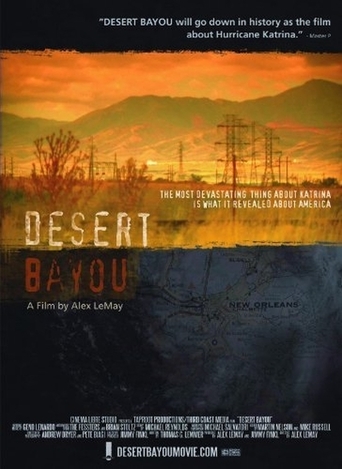Sue Basko
This is a nicely made documentary with clever touches. It tells an interesting story of two men who were among a group of 1000 evacuees from Hurricane Katrina in New Orleans. The people board a Jet Blue to escape the devastation, unsure where they are going. It turns out they are flying to Utah, where people are prepared to help them.The story focuses on two men, Curtis and Clifford, and their families. These folks are not just disaster survivors, they come loaded with personal problems. Curtis is a crack addict. Clifford is a long-ago convicted felon. Other problems are lack of education, poor nutrition, obesity, and a lifetime of a chaos, poverty, and lack of opportunities. And being Black, which one Black speaker in the films says, counts as two strikes against them.This film pulls the race card in inexcusable ways. Instead of lauding this valiant effort of the Utahans to unselfishly help strangers so unlike themselves, this movie slaps those do- gooders hard. This viewer notes that it is not Curtis or Clifford complaining, it is others – Black and white alike, complaining for them. The complaints mar the movie and make it seem shallow, going after the easy, but shamefully false, claim of racist treatment. What are the complaints? First, the refugees got on the plane without being told where they were going. So what? They were being evacuated from a disaster by overworked rescuers, not choosing a vacation at a travel agency. They were taken to a place with warm, dry buildings, clothes, food, medical care, phones, opportunities for life-changing education and jobs. They were not being held hostage and could have gone elsewhere if they had some other place. Nearby states and many major cities were swamped with hurricane evacuees. Utah, a distant state, mostly white, Mormon, crime-free, and diligent was willing to help a group of disaster victims who were mostly Black, poor, Baptist, uneducated, and loaded with personal problems. Second, the hurricane people were searched when they got off the plane and later given background checks. Again, it is not the evacuees themselves complaining. In fact, Clifford talks of being in the tumult at the New Orleans convention center and seeing a man being stabbed, people dying, and children falling over balcony railings. It seems a protective measure to search people before putting them into shared housing. This is anything but racist – it aims to protect people from those among them who may be predatory. The racist thing is to say they are all black, let them fight it out amongst themselves. Third, the refugees were housed on a military base outside Salt Lake City. The complaint –so silly and false -- was that if they were white, they would have been put up in hotels downtown. I am in Southern California at this moment, where wildfires are raging out of control. Hundreds of thousands of people are being evacuated – to school buildings, parks, and a sports arena – where, it is reported, they are behaving nicely and conditions are clean and well-organized. These Katrina refugees were housed in a campus-like enclave of clean, well-constructed buildings with a spectacular view of mountains. It looks like a great place to rest, recuperate, mourn their losses, and receive the services and assistance needed to rebuild their lives. They established their own Baptist church on-site and there is much praise for God getting them through the disaster. The children attend area schools and the adults are offered education and help getting jobs. I suspect that the real complaint is that the Utah base was not a place with easy access to alcohol, drugs, and mischief. But that did not stop Curtis from scoring crack while at the Utah center!The film cuts several times to stock footage of military people firing a Howitzer. I guess this is supposed to be commentary on something. It seems false – the housing at the base seems cozy and secure for the hurricane survivors, and they seem to be receiving every conceivable type of assistance. Rather than this grousing and race-baiting movie, it would have been uplifting to see a film about Utahans donating clothes, time, and money, and reaching out to educate, hire, and provide housing for their guests.The fourth complaint? There is an 11:00 pm curfew at the housing center. How is this racist? Shared housing situations almost always have curfews so that a common group schedule can be effective. In this situation, especially, it is crucial that the late-nighters among them be respectful of those who are trying to rest and reconstruct their lives. Besides, this is Utah. Where would anyone go at night? My movie companion thought the curfew was wrong, that adults should be able to go anywhere they please till whatever time at night. But he has never lived in shared housing. And he has never had a child who had to get up for school. The commenters balk at the refugees being given this slight amount of organization and discipline. But Clifford and Curtis seem to bloom because of it. Curtis is off crack for a while and starts attending culinary school. Soon however, he is off living on his own, back on crack, and drops out of school. He eventually gets a job as a line cook. Clifford, grateful to be in a place with opportunities for the first time in his life, finds a job in construction. He and his wife note better communication in their relationship. Early in the film, Clifford and his wife explain that New Orleans held only struggle for them – poverty, bills, no opportunities. It is touching to see them make a better life for themselves.One hundred Katrina refugees, including Clifford and Curtis, chose to make Utah their permanent homes.
